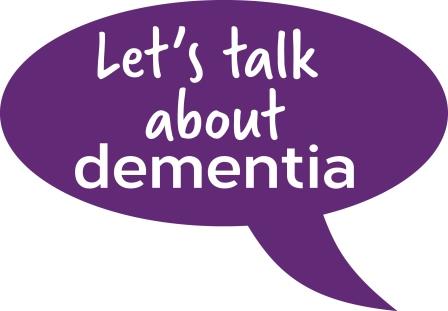
It has most likely happened to us at some point. During conversation with (usually) an older person you’re exchanging information, answering and asking questions, you explain that you’re so and so’s daughter and that you do X for a living. Two minutes later, you’re hit with the question: So who are your parents? And what do you do? You’re taken aback, you pause, then you respond. This will likely happen another two times or so during the course of the interaction. You catch the eye of someone else across the room. They put their index finger to their head and make air circles and shrug. You nod with understanding, and begin to extricate yourself from the conversation with wan apologies and excuses of needing to speak to someone else. You walk away shaking your head with pity and maybe a little fear, fear that someday you’ll succumb to the inevitable fate of failing memory as you age. Words like senile and Alzheimer’s and dementia swirl around in your mind and you pray that you escape such a fate.
Or you have a family member with failing memory and declining cognitive skills and you discuss in hushed tones the fate of your relative, keeping the conversation confined to a select few who understand even without it being said that not a word about the relative’s condition is to be uttered outside of this circle. The silence, the avoidance and the assumptions we make, form the stigma associated with dementia.
Four Facts About Dementia You Should Know
- Dementia is an overall term that describes a group of symptoms that come with a decline in memory or other thinking skills. Dementia is NOT an inevitable part of ageing. It is a disease of the brain.
- Dementia is progressive and starts out with mild symptoms mainly confined to memory loss. Functions that become impaired due to dementia are memory, communication and language, ability to focus and pay attention, reasoning and judgment and visual perception
- Alzheimer’s is only one type of dementia. It is the most common type of dementia though. It causes problems with memory, thinking, reasoning skills, behavior or mood. Persons living with Alzheimer’s may eventually not be able to tell the time anymore, count money or recognize where they are. They may experience personality changes.
- We don’t know what causes dementia, but we do know that living a healthy lifestyle can reduce the risk of developing dementia and that the earlier the diagnosis, the better the chance to intervene with medication that can alleviate the symptoms. Non-drug therapies can also alleviate some symptoms of dementia. These include making the person living with dementia as comfortable as possible, simplifying routines and treating them with respect and understanding.
Dementia: Why Challenge Stigma?
Stigma surrounding dementia and Alzheimer’s is a barrier to getting treatment and care. People don’t like to admit to failing memory for fear of employer victimization, reduced access to health insurance, judgement from others as to total worth and loss of control. It important to remove the stigma that surrounds dementia in order to make it easier to confront what is a disease like any other disease and get early intervention which can significantly improve the quality of life for persons living with dementia.
The Jamaica Response to Dementia
Today, October 1, is being recognized as the International Day of Older persons and September was recognized as World Alzheimer’s Month. This is an international campaign to raise awareness and challenge stigma against persons living with dementia. Last year, over 80 countries participated in World Alzheimer’s Month activities and this year Jamaica was proud to be one of them. We’re not sure just how many persons there are in Jamaica living with dementia. There is one study that estimates that in 2010 there were 19,000 persons living with dementia and that by 2030 this number could increase to 31,000.
The newly revived Alzheimer’s Jamaica organisation exists to help persons living with dementia to understand what they are going through and to provide support to their family members who may also be struggling with the illness.
Alzheimer’s Jamaica is currently lobbying with our Minister of Health for our government to push for dementia to be incorporated in the UN’s Noncommunicable Disease Agenda. Treating dementia as an NCD- which it is because it is a chronic illness- will enable us to allocate more resources and attention to this issue, similar to what we see happening now with diabetes and hypertension. Alzheimer’s Jamaica aims to raise awareness about dementia through public education and reducing stigma by encouraging people to talk more openly about dementia and Alzheimer’s disease.

Tips for Caregivers of Persons Living With Dementia
Remember that the disease is progressive and each person living with dementia is still a unique human being where the disease presents differently. Get the facts about the disease. Understanding the reasons for the changes you observe will help you to be more tolerant, patient and understanding. Remember that some days are better than others for the person living with dementia, so be patient when you are tempted to think that your charge is simply provoking you or just trying to be difficult. Here’s a great list of tips for caring for someone living with dementia.
- Watch your language. Avoid statements that rob persons living with dementia of their dignity and humanity. Don’t make jokes about the disease and its effects.
- Treat people with dementia with respect and dignity. A person’s ability to do things we take for granted will change as the disease progresses. But no matter what stage of the disease, always remember that you’re still dealing with a human being with unique abilities and needs. Don’t talk around them and keep including them in family and social gatherings. Let persons who will be at these gatherings know what is happening so they can be sensitive, but not condescending.
Preventing Dementia: Yes You Can!
- Improve diet and nutrition– eat healthy (fruits, provision, vegetables), drink more water and less sugary drinks like soda.
- Get good sleep– try to have a routine to help you get to bed. Try to go outside and get some fresh air during the day which will help you fall asleep at night.
- Stay socially active, especially if you are retired and are at home. Get active at church, volunteer with AlzJA, continue with your hobbies or start a new one and try to stay in touch with family and friends.
- Exercise regularly– The Jamaica Moves programme is helping persons appreciate the importance of exercise and how fun it can be. So try different things, like sports, running, swimming- just increase your blood flow.
- Reduce stress and anxiety– by engaging with nature, making time for relaxation and self-care, or just getting some quiet time for yourself.
- Challenge your brain– learn something new- like a new language (for free on YouTube) or a new musical instrument. Play word games, if you don’t use it you lose it!
Dementia in Jamaica: Get Involved!
It’s time to be proactive about self-care and it’s time to challenge stigma. Let’s care for those among us living with dementia with love, understanding and respect. Let’s change the conversation around dementia in Jamaica. You can help by sharing this post in your own networks.
For more information on dementia in Jamaica please visit Jamaica Alzheimer’s website at www.alzheimersjamaica.org and go to the ‘Get Involved’ page to learn about becoming a paid member, volunteer or about making a donation.
You can also email them at info@alzheimersjamaica.org, follow them on Twitter @alzheimersja or call 1-876-881-6370.

Is there an Herbal tea in Jamaica that can help restore memory loss?
Hello June.
There is no tea anywhere that can restore memory loss.
The key is to come off all added sugar and processed foods.
All the best!
Kelly